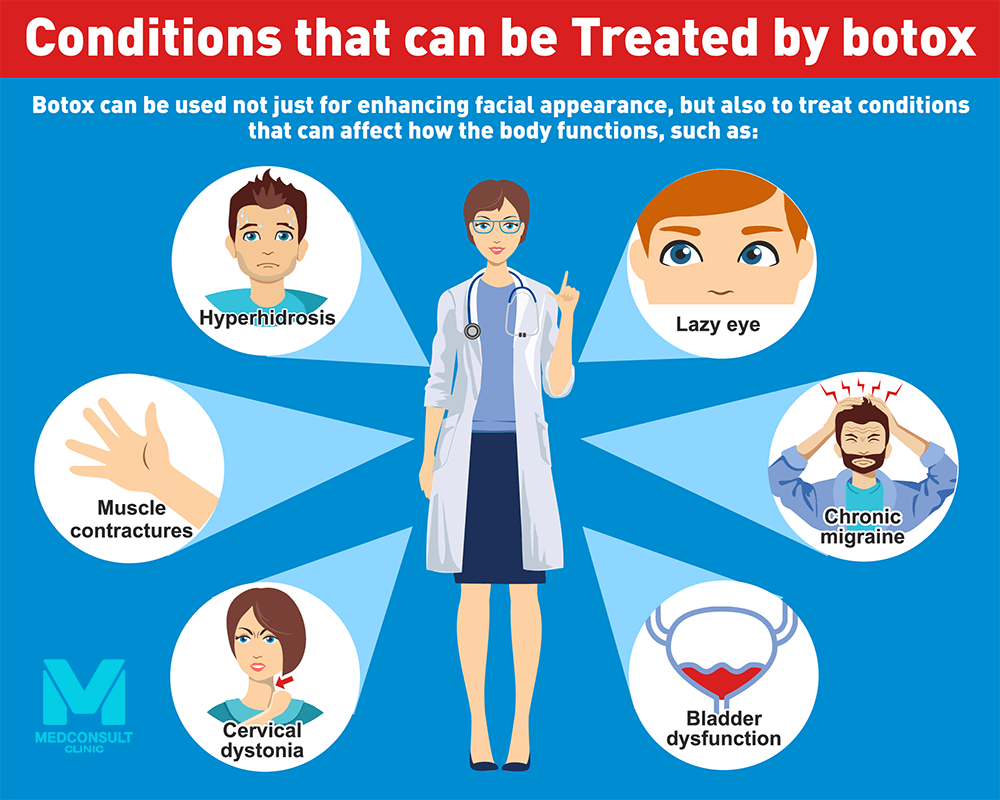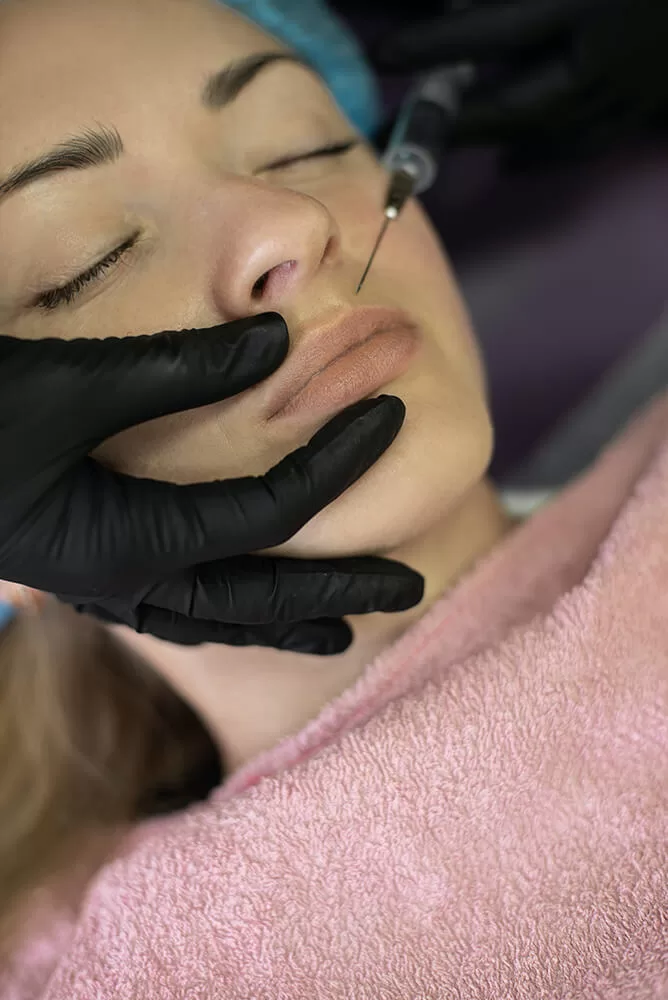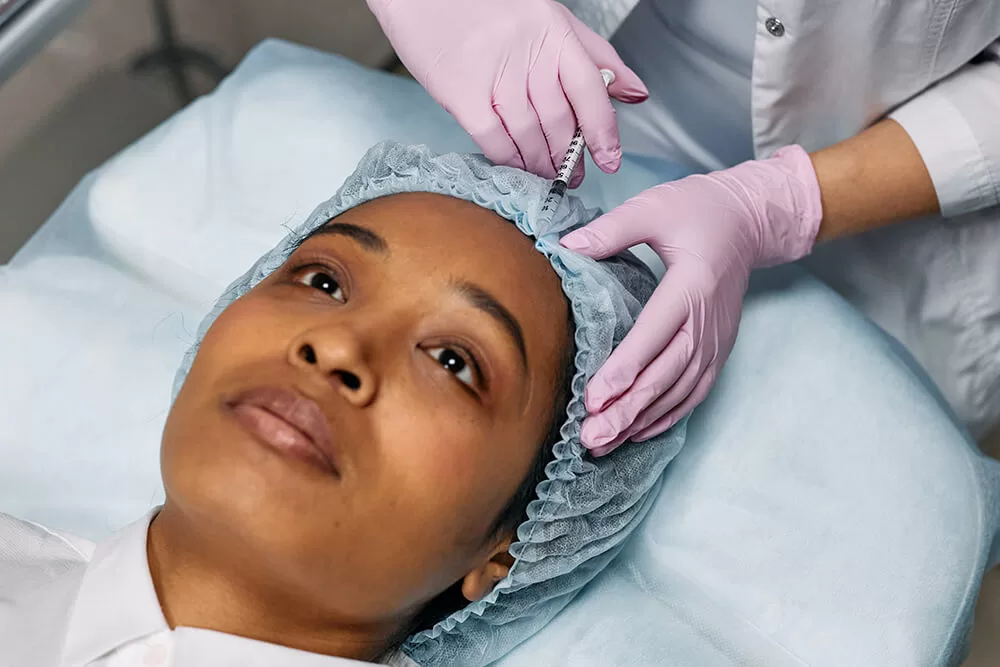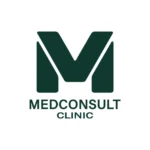Botox, once only associated with celebrities and the overly vain with more money than sense, has now hit the mainstream. MedConsult Clinic stands at the forefront of this transformation, offering the best Botox in Bangkok.
Since its introduction many years ago, Botox is now more affordable, as there are more options in types of Botox and there are more skilled practitioners who can provide safe and effective treatments.
Botox has long been touted as a miracle drug among plastic surgery circles because it seemingly wipes away wrinkles with a few injections. No need for scalpels and face-lifts! Often, it only takes a few minutes, and the results can last for months.
But what is Botox good for, and is it better than other surgical and non-surgical cosmetic treatments? The healthcare professionals at MedConsult want to make sure you are well-informed about Botox as you consider your options, from its origins to post-treatment care.
What is Botox?
First, a little scary stuff. But it all ends well! “Botox” is an abbreviated form of “botulinum toxin”, which happens to be a highly poisonous substance created by the Clostridium botulinum bacteria. If you’ve heard of “botulism”, that’s what we’re talking about. When ingested to poisonous levels, the toxin paralyses nerves by blocking the neurotransmitter acetylcholine, causing muscles to weaken or fail. A clever scientist discovered that this paralysis could be a good thing – in a very diluted form, botulinum toxin can work wonders on wrinkles!
Basically, the Botox that we know and love now does the same thing as botulism, block acetylcholine, but on a very small scale. Injected in an area prone to wrinkles, it prevents muscles in that area from contracting. This creates a smoother, more relaxed look, with fewer fine lines and wrinkles.
More than just wrinkles

As it turns out, Botox can do more than reduce wrinkles and lines for a younger looking appearance. Skilled practitioners can also reshape your face! This could include:
- Creating a softer profile by relaxing prominent jaw muscles,
- Adding definition to the jaw and chin area,
- Augmenting lips for evenness and fullness,
- Recontouring your nose to smooth out bumps or refine angles, and
- Elevating and balancing the shape and structure of eyebrows.
The more professionals are using Botox and understanding its capabilities, the more they are discovering other applications for this unique substance.
And these applications extend beyond smoothing out and reshaping faces. There are now many other treatments and conditions that Botox can remedy or alleviate:

- Hyperhidrosis: Also known as excessive sweating, Botox can also block the nerves that signal your sweat glands to start, well, sweating. This is not just armpits – it can apply to hands and feet as well.
- Migraines: Again, with nerve blockages. In this case, Botox could block the pain transmissions to your brain.
- Overactive bladder: With strategic shots into your bladder, your muscles stay relaxed longer, so you won’t feel the need to go as often.
- Bruxism: If you grind your teeth, Botox relaxes the muscles around your jawline, lessening the occurrence of clenching and grinding. And, you may get a V-shaped face, too!
- Cervical dystonia: Like bruxism, muscle spasms are the culprit. This time it is in the neck, causing your neck to twist and resulting in literal pains in the neck. And shoulders.
Actually, many conditions that are related to nerve or muscle spasms can be treated with Botox, such as lazy eyes, hemi-facial spasms, and eye twitches. It has also been known to help alleviate the muscle spasms associated with cerebral palsy – it is not a cure, but it can help.
For these medical applications, it is essential to remember that you must consult a doctor first! Even for the more “cosmetic” uses for Botox, you may want to check with your GP or dermatologist first to make sure that this is a safe alternative for you.
Risks and side effects of Botox
This section is not to scare you, but just to make you aware that even though Botox is a very common treatment nowadays, you still need to take precautions.
As we just mentioned, you should check with your doctor first before getting Botox shots. If you are pregnant or breastfeeding, you should avoid Botox treatments. This is also the case if you suffer from carcinoma, Lou Gehrig’s disease, or other nerve conditions. If you have vision issues (double or blurred vision, for example), or if you have lung or breathing issues, you may also want to first check with a medical professional, such as Dr Donna and the MedConsult team.
Existing conditions aside, you should disclose if you are taking any medications, such as antibiotics, allergy medication, muscle relaxants, and blood thinners. These are just some of the medications that may interact with the Botox, so you need to make your practitioner aware.
Typically, the main side effects are bruising or swelling at the injection sites, but those should go away relatively quickly. If you have injections near your lips or mouth, you may feel some numbness or have a little slurring. You may want to drink out of a straw for the first few days, just in case!
Other side effects could include skin tightness, dry mouth, sore throat, and flu-like symptoms. These should go away after a day or so, but if they persist, you may want to get medical help. If you rub your injection sites soon after your treatment, you may cause the Botox to migrate and cause drooping eyes or lopsided smiles. To avoid this, see the section on post-treatment care below.
And here we have to revisit the botulism thing. It is highly unlikely, but if the Botox is not diluted properly or incorrectly administered, it could spread to other parts of your body. Symptoms, such as muscle weakness, vision problems, bladder issues, or problems breathing, swallowing, or speaking, should be reported to your doctor right away. We want to repeat again, this is very rare, and is usually the result of getting injections from someone other than a trained professional.
Before your treatment
You really don’t have to do much in preparation for your treatment, although a few precautions may help. The main thing is if you want to avoid bruising. To avoid bruising at your injection sites, you should avoid taking aspirin or anti-inflammatory medicines up to a week beforehand. The same goes for alcohol and garlic (Yes, garlic! It has been known to slow the blood clotting process and promote bruising), but only for a day before your appointment.

You may want to avoid doing any exfoliating or sunbathing (and risk a sunburn) – that might irritate your skin and cause you discomfort during the session. On the day of your appointment, you may want to use a gentle cleanser on your skin and maybe go light on the makeup.
What to expect during your treatment
The best Botox in Bangkok can be found at MedConsult Clinic, and we’re here to paint you a picture of what you can expect during your treatment with us.
Your practitioner will prepare you, talking you through the treatment, especially if this is your first time. You may be asked to smile or scrunch your face so they can better target wrinkle-prone areas, if you are having cosmetic Botox. To reduce the pain from the needle, they may apply a numbing cream like lidocaine about ten minutes before starting the injections, or they may apply an ice compress just before injecting. Some may do both.
Then, before you know it, it is over, and you are free to get on with your day!
After-treatment care
Well, you can get on with your day, but with a few caveats. Just for the day, and maybe the next day, you may want to avoid exerting yourself too much. Exercising is great to get the blood flowing, but you really don’t want that as the Botox is settling in. Makeup is also probably a pass, as you wouldn’t want to irritate the injection sites, and the same goes with cleansers.
As mentioned above, you want to avoid rubbing the injection areas. The shots are targeting certain parts with the Botox. Rubbing may move the Botox away to other areas. The efficacy then is reduced, and you may end up with an unbalanced look or even a drooping eyelid. Laying down soon after the shots may have the same results. It is recommended for you to stay upright for at least four hours after treatment. If you have to lay down, lay down on your back and not on your side or face.
How long does Botox last?
You should start seeing results within a day or so after treatment. Usually, full results are apparent in about three days to a week. The results are not permanent, but they can last around three to six months. So, you may have to set your calendar for your next treatment session. On the upside, if you are not satisfied with the results, you can reconsider the treatment or find another practitioner!
There are a few tips that could help prolong your Botox treatment, especially if it was for wrinkles. Avoid going out in the sun too much, and if you do go out, make sure to wear sunscreen, SPF 50 or higher is probably best. Some practitioners suggest zinc supplements to extend the Botox results.
Overall, good skincare and nutrition will go a long way to help keep you looking and feeling young, even without Botox! And the same can be said for reducing stress in your life. If you’ve taken care of those worry lines with Botox, then you should try to worry less to keep them from coming back!

MedConsult Clinic offers the best Botox in Bangkok
If you have been thinking about Botox or have questions about your options, you should consult a trusted healthcare professional, like Dr Donna Robinson at MedConsult, who holds UK and Thai medical licenses. Dr Donna established this Bangkok clinic in 2003 and has been offering high-quality, affordable medical care ever since. She is fully bilingual in English and Thai, and her staff includes medical practitioners and nurses who speak English, Thai, Japanese, Chinese, and other languages.

